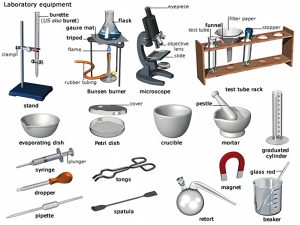P-2. Lab Safety Rules
Joey Wu and Adam Maltese
Safety First
Science experiments are vital for kids. They are useful in understanding the theories and concepts of science that cannot be comprehended alone by science textbooks. But science labs are risky by the very nature of chemicals and lab experiments that are being conducted out there.
10 Science Lab Safety Rules
Here are 10 safety rules that should be followed in science labs to avoid accidents and injuries in the lab.
- Students should not be allowed to touch any chemicals or lab equipment unless they are instructed to do so.
- Students should never ever work in science lab in the absence of their teachers.
- Students must follow all the written and verbal instructions when conducting the science experiment. In case they do not follow anything, they must clarify it first.
- It is very important to be alert and be cautious when in the science laboratory. Eating, drinking, playing pranks, texting should be strictly prohibited.
- Before using any chemicals, read the label carefully. When mixing chemicals or conducting the experiment, keep the test tube containing the chemical away from your face, mouth, and body.
- Unused chemicals should never be put back in the original bottle. They must be disposed of as per the guidelines given by the lab assistant or science teacher.
- Students must be made to wear safety goggles in science laboratory. Avoid wearing loose clothes and open hair while conducting experiments.
- Examine glassware before using. Do not use chipped or cracked test tubes or beakers.
- Hot apparatuses take time to cool down. Allow time to cool them down and use tongs or heat protective gloves to pick them up.
- If any accident takes place, do not panic. Inform your teacher immediately and lab assistants for help.
Common Laboratory Equipment
Laboratory equipment refers to the various tools and equipment used by scientists working in a laboratory. Laboratory equipment is generally used to either perform an experiment or to take measurements and gather data.
Larger or more sophisticated equipment are generally called scientific instruments. Both laboratory equipment and scientific instruments are increasingly being designed and shared using open hardware principles.
Laboratory equipment and scientific instruments are tools used in scientific research and experimentation. They play a crucial role in helping scientists gather data, make observations, and perform experiments in order to advance knowledge in various fields such as biology, chemistry, physics, and medicine. Some of the common laboratory equipment and scientific instruments include microscopes, centrifuges, Bunsen burners, pipettes, graduated cylinders, balances, test tubes, spectrophotometers, Petri dishes, and hot plates. These instruments are used to measure, analyze, and manipulate substances, samples, and data.
Laboratory Equipment & Scientific Instruments with Definition
- Beaker – a glass or plastic container with straight sides that is used in a laboratory
- Bunsen burner – a piece of equipment that produces a gas flame, used for scientific experiments in a laboratory
- Burette – a glass tube marked with a scale and with a tap at the bottom. It is used in laboratories for allowing a small measured amount of liquid to flow into something.
- Filter – an object or piece of equipment that allows you to remove solid parts that are not wanted from a liquid or gas
- Microscope – a piece of equipment for looking at things that are too small to see normally
- Test tube – a long thin glass container that is open at one end and is used in laboratories
- Pipettes – A laboratory tool used for measuring and transferring small volumes of liquid.
- Graduated cylinders – A container with a narrow neck and markings to measure the volume of a liquid.
- Petri dish – A shallow circular dish used to grow bacterial cultures.
- Hot plate – A laboratory appliance used for heating or keeping substances at a constant temperature.
- Balances – An instrument used to measure the weight of an object with a high level of accuracy.

Access from
https://www.eslbuzz.com/english-vocabulary-laboratory-equipment-scientific-instruments/
Media Attributions
- Lab equipments picture

